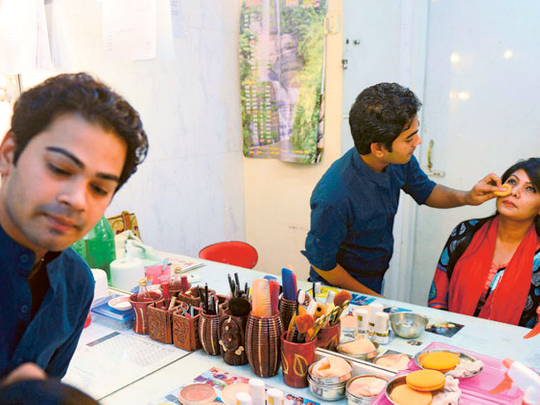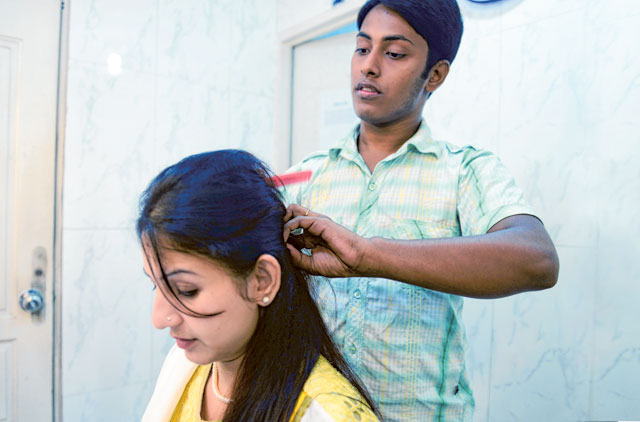
DHAKA: A love for lipstick and eyeliner meant a lifetime of discrimination for Saiful Islam, until a transgender training scheme in Bangladesh helped bring him hard-won acceptance and land him his dream job.
Many transgender people in south Asia, where they are known as hijras, are thrown out by their families and forced to scrape a living through begging, prostitution or drug dealing.
But each morning, Islam pulls on a pair of low-cut jeans and a tight T-shirt, applies his own make-up, and heads off to work in Dhaka at the offices of ATN Bangla, Bangladesh’s largest private television channel.
“The best part of my job here is that my colleagues treat me like any other human being. For a hijra this is a great achievement,” Islam, who started his new career eight months ago, told AFP.
“A crowd would build up to see me and my three other hijra colleagues when we joined ATN Bangla. Some would even tease us. Now everything is normal. We’re like any other staff.”
Islam, 22, is the beneficiary of government efforts to help transgender people who are among the most marginalised and discriminated groups in India and Bangladesh.
Last year he was one of 30 hijras to attend a technical school to take courses in videography, garment-sewing and beauty care to help them get jobs and integrate into mainstream society.
After six months of training, his friends Bobby and Chanchal found positions as video editors at ATN Bangla, while Islam and Opu became make-up artists at the station.
A painful childhood
Islam, whose job is to ensure presenters and newsreaders look their best just before they go live on air, says the changes to his life have been “nothing short of a miracle”.
“We never dreamt that one day we can work in offices like other normal people,” he said.
Born to a middle-class family in Dhaka, Islam became used to harassment and abuse from when he was a small child and started wearing women’s clothes and lipstick.
“Seeing me wearing saris and bangles, my brothers would become so furious that they would tie me up, beat me with a cane and keep me hungry,” he said.
At 18, Islam did what tens of thousands of south Asian transgenders do and fled home to join a hijra community where he found the freedom to wear what he liked.
Hirja groups traditionally earn money by turning up at weddings, births and other occasions, where they loudly refuse to leave until they have been given cash.
Islam says he hated using extortion, and his time in the hirja community was blighted by sexual abuse and violence.
“Two years ago, I was coming from a dancing show wearing a sari, bangles and fake breasts when this gang held me by pointing a knife at my throat,” he said.
“They tortured me one after another, shouting that my job is to entertain them.”
Now Islam earns 10,000 take (Dh480) each month, more than three times higher than the national minimum wage, and he has a long-term plan to open a beauty parlour.
“I’ve now left the hijra den and am back living with my mother. Before this job, I lost my faith in people,” he said.
Hijras ‘no longer taboo’
Ebadur Rahman, a government official who oversees the project to train up hijras, said the success of the first batch of graduates had encouraged him to organise another programme to help others develop business skills.
“A lot of private sector people have approached us for recruiting hijras. Garment factories are the keenest as they are suffering from an acute labour crisis,” he said.
Last year Rahman’s project did what was until recently unthinkable in this overwhelmingly conservative Muslim country: holding a rally in Dhaka for more than 1,000 transgender people.
“Our biggest achievement is that the hijra issue is no longer taboo. Even the policymakers have now realised that marginalisation is not the answer. If you keep them away, they will remain a problem forever,” said Rahman.
The government has since unveiled a monthly stipend to elderly hijras and is setting up a permanent training centre exclusively for transgenders where they will be able to learn skills to help them find work.
“This is the first time a Bangladesh government has taken up any schemes for the hijra community. We want to ensure social and job security so they have a decent life,” said Abu Taher, deputy director of social welfare ministry.
For Pinki Shikder, a social activist who has fought for decades on behalf of the country’s estimated 150,000 hijras, the apparent change in official attitudes is welcome - but she struck of note of caution too.
“We are very happy that the state is at least thinking about our rights, especially in a country where even women often are not given full rights yet,” said Shikder, head of the Bangladesh Hijra Association.
“But we are still at the start of our journey. We’re talking about a few projects and just a few people getting jobs - against a need that is so overwhelming and a problem that’s thousands of years old.”













